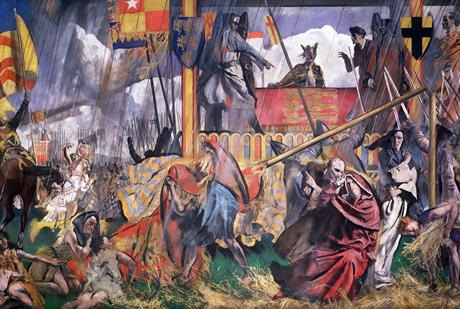
Magna Carta

Introduction
During 1214, about forty of John's barons complained about the way the king was running the country. They demanded changes in the government.
When John heard what they were asking (in April 1215), he refused to agree. 'Why not ask for my kingdom?' he replied angrily.
In May the barons, led by Robert fitzWalter, met, renounced their feudal oath to the king. Calling themselves 'The Army of God and the Church', they marched on London. Some traitors opened the gates for them. The rebels went in and looted the city.
John did not want a war with his barons. On 15 June 1215 he met them at Runnymede meadow, on the south bank of the River Thames near Windsor Castle. There he signed the Magna Carta (the Great Charter) – a list of 63 promises.
Over the years, the Magna Carta has been changed and re-written. In the civil wars of the seventeenth century, Parliament used it as an excuse to go to war against King Charles I. It became the basis of Britain's freedom and democracy.
At the time in 1215, however, nobody knew how important it would become. John did not keep his promises. By August 1215 the two sides were at war.
John was attacked on all sides. The Welsh and the Scots invaded England. Some of the barons invited Louis Capet, son of Philip II of France, to take the throne. In the spring of 1216, Louis landed in Kent. John rushed about the country, fighting his enemies, but he became ill and died on 18 October 1216.
Study this webpage, then answer the question sheet by clicking on the 'Time to Work' icon at the top of the page.
Links:
The following websites will help you research further:
The Magna Carta:
• History Learning Site
•
Our Island Story - a narrative story account by the children's writer, HE Marshall (1905)
•
BBC KS3 Bitesize - important website •
The Magna Carta barons
•
This British Library Viewer allows you to study the actual Magna Carta itself •
Timelines TV
and Mr Zoller
•
NIDirect - the government website for Northern Ireland - has a useful page on
Children's human rights today
1 King John signs Magna Carta
This picture of King John signing the Magna Carta was painted in the nineteenth century; it is now in the Houses of Parliament.
How does the picture depict the event as a disaster for John?

2 Magna Carta
The Magna Carta contained 63 promises. Some of the most important promises are listed below.
1. The English Church shall be free to choose its own bishops and archbishops.
2. A baron's son shall inherit his lands on payment to the king of £100, and no more.
10. The king cannot take a tax unless the barons and bishops agree to it in the Great Council.
20. People found guilty in a court of law will not have to pay huge fines for small crimes.
28. No government official can take the corn, horses, carts or wood of a freeman unless that freeman agrees.
39. No freeman shall be arrested or imprisoned without a proper trial by his equals according to the laws of the land.
40. The king cannot sell, deny or delay justice to anyone.
41. All merchants shall be free to travel and trade where they want, without having to pay tolls.
49. The king will immediately return all the hostages he took to make people support him.
51. The king will send out of England all the foreign knights and soldiers he hired.